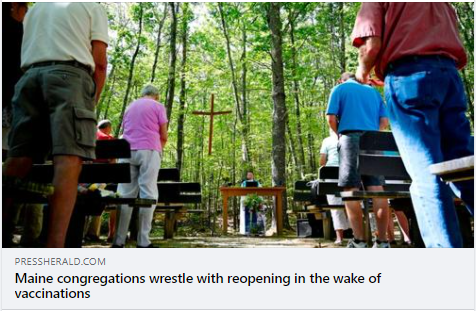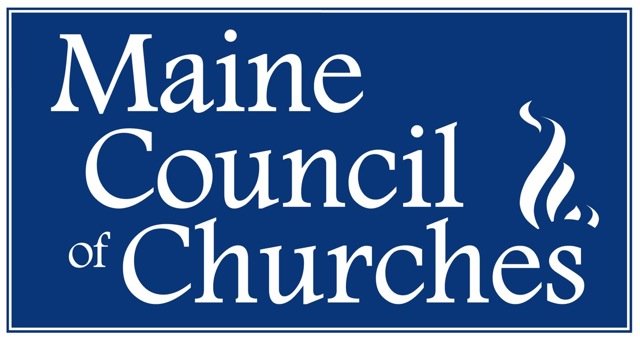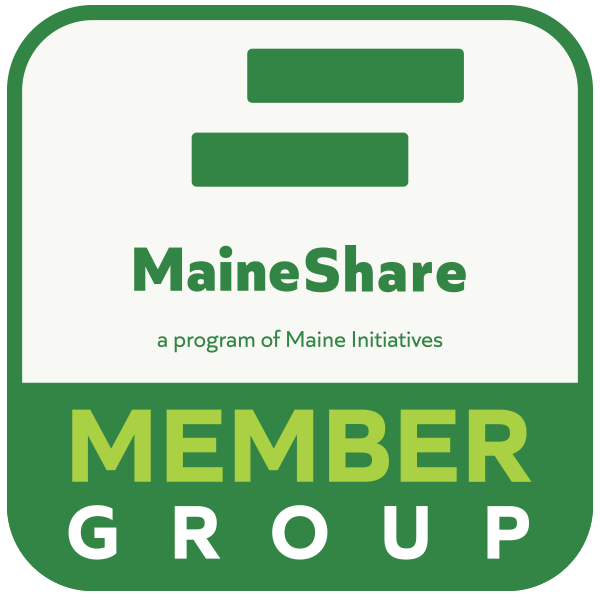Maine congregations wrestle with reopening in the wake of vaccinations

Faith groups across the state are returning to ‘a new normal,’ knowing that some members may not be inoculated.
By Kelly Bouchard Staff Writer for the Portland Press Herald

Behind Faith Lutheran Church in Windham, up a flight of wooden steps, a small congregation gathers in its outdoor chapel.
There are no walls here, only the towering oaks, maples and pines that rim a sun-dappled clearing. Ten long benches flank a center aisle. A rustic wooden cross strung from wires seems to float among the leafy branches above the altar. Birds chirp and squirrels scurry nearby, and the traffic on Route 302 hums in the distance below.
The Sunday morning service, held last week, opens with a rendition of “Morning Has Broken,” performed by a pianist and soloist. No one wears a mask, which is no longer required in most settings, especially outdoors. Pastor Jane Field delivers an engaging sermon on the importance of being connected and doing for others amid a global pandemic.

Then, Field invites the 20 or so people in attendance to rise and “share the peace” of Jesus Christ. Within seconds, they are up and milling about, shaking hands and hugging and exchanging warm greetings. It’s a welcome change from just smiling and nodding and showing each other peace hand signals from a distance.
“It was the first time we were able to hug in over a year,” Marilyn Walsh, a church elder, explains after the service. “We’re a very loving, hugging church, so we missed it a lot.”
Across Maine, religious congregations are reopening and resuming or expanding in-person worship services in the wake of widespread vaccination against COVID-19, falling death and case counts, and relaxed masking and capacity mandates. Amid the joyous reunions and resumption of religious traditions, however, many faith groups are debating the finer points of getting back to normal, or in many cases, “a new normal.”
As Christians, Jews, Muslims and other faith communities relish a return to past practices, some are wrestling with whether to drop masking and distancing requirements at prayer services when they don’t know who’s vaccinated and are reluctant to inquire. Some are choosing to continue wearing face coverings, which are no longer required in most public settings, rather than ask people if they are vaccinated.
Some are being extra cautious, gradually rolling out policy changes as “soft openings” rather than rushing back to business as usual. And many are planning to keep some aspects of worship during the pandemic that have proven to be especially beneficial to individuals and entire congregations, including livestreamed services that have drawn viewers around the globe.
“It’s all anyone is talking about in the church world: How do we safely come back together for in-person worship?” said Field, who is executive director of the Maine Council of Churches.

“But I never say we’re getting back to normal, because it will never be the same,” Field said. “This is a new normal, and people are struggling with what’s the reasonable thing to do about masking and social distancing, and what to do about members who may not be vaccinated.”
Field noted that unvaccinated members include those who may refuse to get the shot for political or other personal reasons, as well as those who cannot get the shot for medical reasons or because they are under age 12 and currently aren’t eligible.
Many congregations are following recommendations of the Maine and U.S. Centers for Disease Control and Prevention, which have greatly relaxed masking, distancing and other health protocols that had been in place since the pandemic took hold here in March 2020. This month, Gov. Janet Mills announced that the state of civil emergency she enacted back then will end June 30.
This weekend, the Roman Catholic Diocese of Portland resumed many practices that were stopped more than a year ago, such as having parishioners line up to receive Communion, making holy water available at church entrances and allowing food to be sold to the public at parish suppers and fundraisers.
The diocese stopped requiring face coverings and social distancing at Mass in May, when the state lifted its masking mandate and indoor capacity limits. But for the time being, the diocese still wants parishes to avoid physical contact when exchanging the Sign of Peace.
“The diocese has been guided by experts and science in making decisions throughout the pandemic,” said Dave Guthro, diocesan spokesman. “We have acted with caution and continue to do so.”

Guthro said “things have gone quite smoothly” since the diocese lifted masking and distancing requirements last month. Moreover, he said, since the diocese resumed celebrating public Masses in June 2020, no COVID-19 outbreak has been traced to any of the 141 Catholic churches in Maine over the course of more than 30,000 Masses.
As always, Guthro said, anyone who is sick should attend Mass via livestream rather than in person, and anyone who isn’t fully vaccinated should wear a mask, along with anyone who’s not yet comfortable with the relaxed protocols.
“Many churches are providing spaces in other areas, like parish halls, for additional, spread-out seating during Masses,” he said. “We want to make sure that we are doing everything we can to keep people safe and fulfill the mission of the church.”
Federal and state health authorities still recommend face coverings in indoor public settings for anyone who isn’t fully vaccinated, as well as in health care and congregate living situations. More specifically, the Maine CDC recommends that people who are not fully vaccinated should wear masks when attending indoor public gatherings, including worship services. But in-person services are being heartily encouraged.
“COVID-19 vaccination has made it possible for Maine people to worship safely together again,” said Dr. Nirav Shah, director of the Maine CDC, in a prepared statement.
Despite Shah’s encouragement, the Maine Muslim Community Center in Portland continues to require members to wear masks and stay 3 feet apart during prayer services, even though many have been vaccinated at clinics held at the mosque.
“Masking is still in effect here whether you’re vaccinated or not,” said Abdirahman Osman, president of the center. “We encourage everybody to get vaccinated, and most people here are vaccinated, but I know some are not fully vaccinated yet. So when we are in the prayer room, we wear masks, because we don’t know who is vaccinated.”
Osman said the center on Anderson Street likely will require masking through the summer months. It may relax health protocols as vaccination becomes more widespread and if virus transmission remains low.
During a recent Zoom meeting with Shah, faith leaders across Maine peppered him with questions about masking, social distancing, exchanging signs of peace, asking members about vaccination status and the benefits of holding services outdoors.
“Dr. Shah had the patience of a saint,” Field said. “People had lots of questions.”
To address health concerns related to communion, when churches share bread and wine representing the body and blood of Christ, many may continue distributing small prepackaged individual plastic cups that contain both, Field said.
Several clergy asked Shah whether they should resume singing during services and whether wearing masks would protect unvaccinated members, Field said. There is some concern that most face coverings allow droplets to escape when singing, she said. Shah recommended singing outdoors, where the risk of aerosol virus transmission is lower than indoors.

Congregations that can are holding services outdoors, in gardens, on lawns or in parking lots, Field said. Some are upgrading ventilation systems to improve indoor air quality, including Faith Lutheran Church, where one member is a retired air quality engineer. He recently installed a top-quality exhaust system for the $1,500 cost of supplies he purchased online.
Ultimately, many questions that faith leaders have about reopening must be decided by each congregation because the state’s COVID-19 guidelines and recommendations have become increasingly generalized.
At Congregation Bet Ha’am, a Reform Jewish community in South Portland, the board of trustees approved a reopening plan last week that was developed by a COVID-19 advisory task force, President Sylvia Most said.
“It’s a soft opening,” Most said. “We’re happy to get back into the building. We’re slowly coming back together.”
The building on Westbrook Street has been closed to the public for more than a year, and members attended worship services exclusively via Zoom for most of that time. In May, the congregation started letting 10 to 20 members attend services in the sanctuary while others continued to participate via Zoom.
This week, Congregation Bet Ha’am will reopen and allow anyone to attend services there – as long as they wear masks.

“We will continue to wear masks because a good deal of our service involves singing,” Most said. “We took the stance that in most groups, some people will be vaccinated and some people won’t. We’re not going to ask (whether people are vaccinated) because it feels invasive.”
And the congregation will continue to livestream services, Most said.
“We will continue to Zoom to meet some members’ needs,” she said.
Many faith communities have benefited from incorporating livestreaming into their services and plan to continue the practice, Field said. It not only allowed them to meet when the pandemic made large gatherings unsafe, it also resulted in expanded participation among members who previously were homebound or unable to attend for other reasons, including summer residents and people who were traveling.
Catholic churches across Maine saw significant increase in participation through livestreaming, Guthro said.
Weekend Masses at many parishes that would draw 200 people in person before the pandemic saw audiences over 500 online, he said. The livestream at Our Lady of Perpetual Help Church in Windham has drawn Mass participants from 49 states (all but Alaska) and 29 countries.
At the Cathedral of the Immaculate Conception in Portland, which typically saw 20 to 40 people at its weekday noontime Mass, livestreamed services started during the pandemic drew more than 100 people consistently. Even the nightly prayer and discussion groups held by priests of Prince of Peace Parish in Lewiston draw hundreds via Facebook Live.
“The numbers and views across the board were staggering,” Guthro said. “This technology enabled us to stay connected with parishioners and continues to allow those who are sick, caring for the sick, or otherwise unable to attend in person to participate in Mass. We have heard from non-practicing Catholics and non-Catholics alike who have been reignited in faith at this time through these many channels.”
Back at Faith Lutheran Church last Sunday, the congregation is making the most of both its chapel in the woods, built more than 30 years ago, and Zoom technology that allowed members to meet through the winter, when in-person services at the church were impossible. Services were held outdoors until Nov. 8 last year and resumed April 4 for Easter.
Field is livestreaming to eight participants watching from home, including one member who reports during the service on her recent experience as a delegate to a regional meeting of Lutherans.
Beneath the leafy green canopy, Field gives a topical sermon on recent research that shows trees communicate and care for each other through their roots. Her talk captivates the congregation and resonates on many levels, in this particular place, more than a year into a pandemic that has tried and tested many of us.
“It is a beautiful metaphor from nature about how we are meant to exist in community,” Field tells the congregation. “We are meant to be connected, too. We, too, are meant to love and help our neighbors.”

